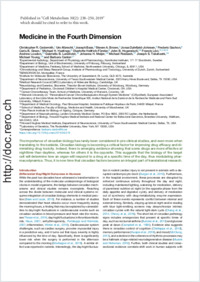Medicine in the fourth dimension
- Cederroth, Christopher R. Experimental Audiology, Department of Physiology and Pharmacology, Karolinska Institutet, 171 77 Stockholm, Sweden
- Albrecht, Urs Department of Biology, Unit of Biochemistry, University of Fribourg, Fribourg, Switzerland
- Bass, Joseph Department of Medicine, Feinberg School of Medicine, Northwestern University, Chicago, IL 60611, USA
- Brown, Steven A. Chronobiology and Sleep Research Group, Institute of Pharmacology and Toxicology, University of Zurich, Zurich, Switzerland
- Dyhrfjeld-Johnsen, Jonas SENSORION SA, Montpellier, France
- Gachon, Frederic Institute for Molecular Bioscience, The University of Queensland, St. Lucia, QLD 4072, Australia
- Green, Carla B. Department of Neuroscience, University of Texas Southwestern Medical Center, 5323 Harry Hines Boulevard, Dallas, TX 75390, USA
- Hastings, Michael H. Medical Research Council (MRC) Laboratory of Molecular Biology, Cambridge, UK
- Helfrich-Förster, Charlotte Neurobiology and Genetics, Biocenter, Theodor-Boveri Institute, University of Würzburg, Würzburg, Germany
- Hogenesch, John B. Department of Pediatrics, Cincinnati Children’s Hospital Medical Center, Cincinnati, OH, USA
- Lévi, Francis Cancer Chronotherapy Team, School of Medicine, University of Warwick, Coventry, UK - Warwick University on “Personalized Cancer Chronotherapeutics through System Medicine” (C2SysMed), European Associated Laboratory of the Unité Mixte de Recherche Scientifique 935, Institut National de la Santé et de la Recherche Médicale and Paris-Sud University, Villejuif, France - Department of Medical Oncology, Paul Brousse Hospital, Assistance Publique-Hopitaux de Paris, 94800 Villejuif, France
- Loudon, Andrew School of Medicine, Faculty of Biology, Medicine and Health, University of Manchester, UK
- Lundkvist, Gabriella B. Max Planck Institute for Biology of Ageing, Cologne, Germany
- Meijer, Johanna H. Department of Neurophysiology, Leiden University Medical Center, PO Box 9600, 2300 RC Leiden, the Netherlands
- Rosbash, Michael Department of Biology, Howard Hughes Medical Institute and National Center for Behavioral Genomics, Brandeis University, Waltham, MA 02453, USA
- Takahashi, Joseph S. Howard Hughes Medical Institute, Department of Neuroscience, University of Texas Southwestern Medical Center, Dallas, TX, USA
- Young, Michael Laboratory of Genetics, The Rockefeller University, New York, NY 10065, USA
- Canlon, Barbara Experimental Audiology, Department of Physiology and Pharmacology, Karolinska Institutet, 171 77 Stockholm, Sweden
-
06.08.2019
Published in:
- Cell Metabolism. - 2019, vol. 30, no. 2, p. 238–250
English
The importance of circadian biology has rarely been considered in pre-clinical studies, and even more when translating to the bedside. Circadian biology is becoming a critical factor for improving drug efficacy and diminishing drug toxicity. Indeed, there is emerging evidence showing that some drugs are more effective at nighttime than daytime, whereas for others it is the opposite. This suggests that the biology of the target cell will determine how an organ will respond to a drug at a specific time of the day, thus modulating pharmacodynamics. Thus, it is now time that circadian factors become an integral part of translational research.
- Faculty
- Faculté des sciences et de médecine
- Department
- Département de Biologie
- Language
-
- English
- Classification
- Medicine
- License
-
License undefined
- Identifiers
-
- RERO DOC 327355
- DOI 10.1016/j.cmet.2019.06.019
- Persistent URL
- https://folia.unifr.ch/unifr/documents/308269
Statistics
Document views: 155
File downloads:
- pdf: 297
